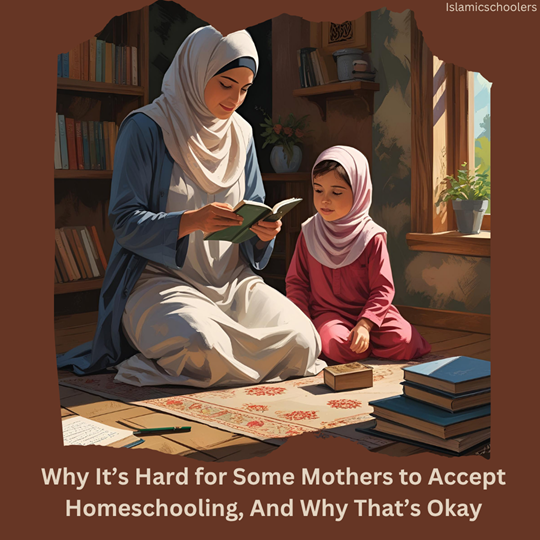Why It’s Hard for Some Mothers to Accept Homeschooling, And Why That’s Okay
By Anie Hamza / June 24, 2025 / No Comments / Uncategorized

A gentle reflection on parenting choices and the beauty in our differences
There’s a certain quiet ache that forms in a mother’s heart when she’s trying her best but still feels like she’s falling behind. A child’s torn notebook, a forgotten lunchbox, the third parent-teacher meeting missed because of work, it all piles up. And then, almost out of nowhere, a well-meaning friend says she’s started her homeschooling journey. She talks about flexible routines, Quran lessons before breakfast, and learning science in the garden. The mother of a school-going child nods politely, but inside, a mix of confusion, guilt, and even doubt begins to stir.
This reaction isn’t jealousy or criticism, it’s something far deeper. It’s the fear that maybe, just maybe, she’s not doing enough. That someone else has found a better way. But motherhood isn’t a competition, and neither is education. When comparing school vs homeschool, it’s easy to get lost in assumptions. Homeschooling benefits are often shared online with cheerful photos and poetic captions, while the struggles stay behind closed doors. But both traditional schooling and homeschooling come with sleepless nights and self-doubt. They both require love, patience, and sacrifice.
The reality is, modern parenting is hard. And the pressure to make the “right” decision about our children’s education can feel overwhelming. Some mothers find peace in sending their children to school, trusting the system and valuing routine. Others discover joy in the homeschool lifestyle, curating each lesson to their child’s interests. Neither choice is easy. Both require strength. Both are valid.
For some mothers, it’s difficult to accept that homeschooling families are thriving in their own way. It feels unfamiliar, maybe even risky. And in the middle of trying to balance work, chores, school pick-ups, and emotional care, hearing about someone teaching their child math on the living room floor might seem impossible or even judgmental. But it isn’t. It’s just a different way, a quiet, less-traveled path that works for some and not for others.
Rather than comparing, we can start connecting. Motherhood comparison only creates silent walls between women who could be supporting each other. Instead of asking which method is better, homeschool vs traditional school, let’s ask: Is this child safe? Is this child growing? Is this mother supported in her journey?
We don’t need to choose sides in this conversation. What we need is more space to talk honestly. Homeschool support for mothers is just as necessary as encouragement for school moms juggling responsibilities. Sharing stories over tea, listening without the urge to fix or judge, that’s where true understanding begins.
To all the mothers reading this: you are doing enough. Whether your child is learning in a classroom, a garden, or beside you at the kitchen table, what matters most is your love and commitment. The world may try to divide us with labels like “homeschooler” or “school mom,” but at the end of the day, we are all simply mothers, trying our best in the way we know how.
And that, in itself, is something to be proud of.
